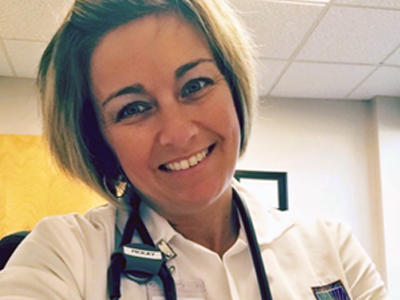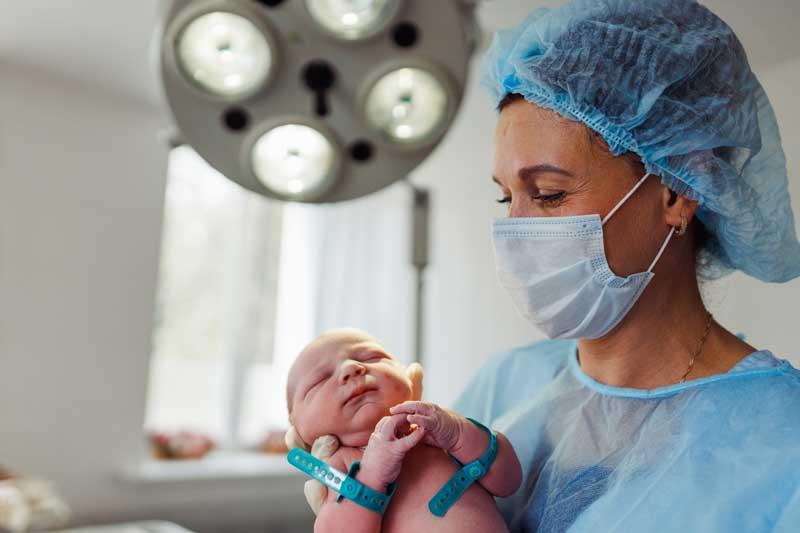Featured
Tags
Share
- Home / Blog / Tips for Students / What is an FNP?
What is an FNP?

Do you love your job as a registered nurse but want to broaden your healthcare responsibilities? If so, you may want to consider becoming an FNP. But what is an FNP? And is it the right fit for you? Let’s explore the answers to these and other relevant questions about this growing nursing career field.1
What Is an FNP?
FNP stands for family nurse practitioner. An FNP is an advanced practice registered nurse (APRN) who is trained and nationally certified according to very strict standards.
What can a family nurse practitioner do? While RNs assess patients and carry out treatments according to a doctor’s plan, FNPs can assess and diagnose patients and create their own treatment plans. They can prescribe medication, serve as a patient’s ongoing direct point of contact for medical care and make referrals to specialists.
FNPs work collaboratively with other healthcare professionals to ensure patients receive comprehensive and coordinated care. They also educate patients about disease prevention and wellness. Family nurse practitioners have the opportunity to see patients over time and act as their primary care providers. FNPs can perform in-office procedures on a one-time basis or see patients over time for acute or chronic issues.
Let’s look at an example that illustrates an FNP’s role in a healthcare setting:
A patient comes to a clinic because he’s concerned about managing his diabetes. An RN will take his vitals, conduct an initial assessment of his overall health and inform the doctor of any updates since his last visit. The doctor will then assess the diabetic patient, prescribe a new treatment plan and, if necessary, adjust his medication.
If the same patient sees a family nurse practitioner who specializes in treating diabetes, the FNP can handle all aspects of that visit. Her education, training and licensure as an FNP qualify her to act in that capacity.
What Is the FNP Scope of Practice?
The FNP scope of practice makes family nurse practitioner an attractive career choice for many RNs.
Graduate school training and clinical hours provide the foundation for becoming a primary care provider or clinician for specific populations or medical conditions. FNPs provide care in settings ranging from urgent care centers to outpatient clinics, looking after patients with needs in areas such as women’s health, diabetes management and pediatric acute care.
FNPs are trained to perform procedures ranging from nerve blocks to incision and drainage for wound care. Many family nurse practitioners receive training in other advanced procedures. For example, an FNP specializing in women’s health may learn how to perform Pap smears and implement family planning methods, such as placing intrauterine devices.
In addition to disease prevention, screening and treatment in an outpatient setting, the family nurse practitioner role includes patient education and guidance. This teaching component is often a very rewarding part of the FNP role. It gives nurses a chance to really connect with their patients and, if they can help the patient implement lifestyle or behavioral changes, to make a crucial difference in the long run. Many FNPs say watching a patient’s health improve over time is one of the more rewarding aspects of this nursing career.
FNPs often co-manage a panel of patients alongside a physician. However, the FNP scope of practice means that they collaborate with physicians in a way that is quite different from RNs. As an FNP, you will get to take the lead in most assessment and treatment processes, asking for input as needed.
How Do I Prepare for the FNP Role?
You can prepare for the FNP role by enrolling in a CCNE-accredited master’s in nursing program with an FNP specialty track.
An MSN FNP program typically takes three years to complete and requires at least 500 hours of clinical practice. Clinical hours are important for gaining competency in new skills and responsibilities. It’s the time when you begin trying out your new role under the guidance of a clinical preceptor, a person committed to your success and well-being.
After completing coursework and clinical hours, you can sign up for board exams through the American Association of Nurse Practitioners (AANP) or the American Nurses Credentialing Center (ANCC). You will also want to check your state’s licensing requirements for family nurse practitioners and find out how often your license will need to be renewed. Upon passing this exam, you will be a licensed family nurse practitioner.
Start the Journey to Become a Family Nurse Practitioner
You can start the journey to become a family nurse practitioner by choosing an MSN FNP program. If you’re an RN with a Bachelor of Science in Nursing (BSN), you may want to consider Chamberlain University’s master’s program.
Chamberlain’s online Master of Science in Nursing (MSN) degree program with a Family Nurse Practitioner specialty track is the largest in the U.S. and CCNE accredited. With 100% of coursework online, the MSN FNP program gives you the flexibility to study where and when it’s most convenient for you.
With Chamberlain, you’ll get valuable hands-on experience during your practicum. And licensing exam preparation is built into your online nursing degree program, offering you another tool to help you prepare for your future as an FNP.
The U.S. Bureau of Labor Statistics (BLS) projects employment of APRNs — specifically nurse practitioners, nurse midwives and nurse anesthetists — will grow by 38% from 2022 to 2032, which is much faster than average for all occupations.1 The BLS estimates there will be an annual average of approximately 29,200 job openings during that time period.1
“As the demand for healthcare continues to rise … NPs can increase access to high-quality primary, acute and mental healthcare for patients of all ages in every community,” AANP President Stephen Ferrara said in a media release.2
If you are interested in preparing for other nurse practitioner jobs in this growing career sector, Chamberlain also offers these online MSN specialty tracks: Adult-Gerontology Nurse Practitioner and Psychiatric-Mental Health Nurse Practitioner.
Get more information on Chamberlain’s MSN FNP degree program and start your journey to meet your nursing education and career goals.
Chamberlain University, an accredited institution, offers bachelor’s, master’s, doctoral and certificate programs in nursing and healthcare professions. With a growing network of campuses and robust online programs, Chamberlain continues to build on more than 130 years of excellence in preparing extraordinary healthcare professionals.
1Source: www.bls.gov/ooh/healthcare/nurse-anesthetists-nurse-midwives-and-nurse-practitioners.htm#tab-1
2Source: www.aanp.org/news-feed/nurse-practitioner-profession-grows-to-385-000-strong
Family Nurse Practitioner FAQs
What is an FNP in nursing?
FNP stands for family nurse practitioner. An FNP is a registered nurse who is trained and nationally certified according to very strict standards.
What is an FNP degree?
An FNP degree prepares you for your career as a family nurse practitioner. Chamberlain offers a Master of Science in Nursing FNP program, featuring 100% online coursework.
Why should I become a family nurse practitioner?
What is an FNP and why should you become one? To start, the family nurse practitioner's scope of practice is quite diverse, allowing for career mobility, specialization in a specific patient demographic, and practice in a variety of clinical settings. There are many other benefits to becoming a family nurse practitioner. Learn more here.
By Chamberlain University
More from Tips for Students
Request More Information
To receive the Chamberlain University Program Guide, including associated career paths, please select a program of study.






